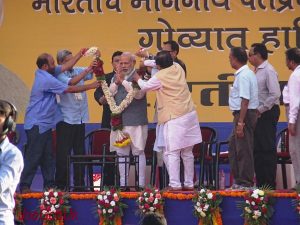In what is being widely seen by some as a further example of diminishing space for dissent and criticism in India, Amnesty International suspended its operations in the country earlier today. A statement released by the international human-rights organization quotes the executive director of its India branch, Avinash Kumar, as saying that “the continuing crackdown on Amnesty International India over the last two years and the complete freezing of bank accounts is not accidental,” going on to add that “the constant harassment by government agencies including the Enforcement Directorate is a result of our unequivocal calls for transparency in the government …” The Amnesty statement also notes that the Indian government froze its bank accounts on September 10 — the final chapter in a series of Indian government actions that started in October 2018 – making continued operations impossible.
The Indian Ministry of Home Affairs in a statement, in turn, has suggested Amnesty India has interfered in “domestic political debates,” aided by foreign funding in contravention to Indian law. Specifically, India requires non-profit organizations receiving foreign funding to obtain clearance under the Foreign Contribution (Regulation) Act (FCRA). It has noted that successive governments have refused to grant Amnesty India FCRA clearance, pending which Amnesty UK routed money to the Indian branch as Foreign Direct Investment. (Amnesty India suspended operations in 2009, with the left-of-center Congress Party-led coalition in power in New Delhi.)
The Amnesty announcement come amid growing criticism of the Narendra Modi government’s role in curbing probes into the state of human rights in the country as well as a perceived shift toward illiberalism. Indeed, Modi has been consistently criticized by international media since last August when his government revoked Kashmir’s autonomous status and introduced a controversial amendment to India’s citizenship law in December.
These largely domestic developments have, in turn, spilled over to foreign policy debates.
In a Carnegie Endowment essay published on September 9, scholar and former U.S. government official Ashley Tellis – who enjoys unparalleled access to the corridors of power in New Delhi – warned that “the community of liberal democracies internationally stands to lose if domestic unrest fueled by confrontational politics stymies India’s growth or if India enlarges its material capabilities only by sacrificing its liberal character.” Tellis added that “[e]ither outcome would dilute the West’s eagerness to partner with India.” This predictably sparked a small storm on social media, among analysts, scholars and a section of (the perennially aggrieved) Indian public. Reacting to the Amnesty news today, The Diplomat’s Southeast Asia Editor Sebastian Strangio tweeted: “Western governments should be cautious in describing Narendra Modi’s #India as ‘like-minded.'”
Not all are convinced that India’s domestic churn can – or will – affect its deepening partnerships with Western democracies, the United States in particular. Some suggest that historical examples do not bear out the claim that domestic political orientation matters in alliances or partnerships, as long as one “illiberal” partner’s disposition does not spill out externally. Indeed, as Scott Harr points out in a new essay in these pages, the United States’ Middle East engagement record shows that Washington has rarely cared for its partner’s domestic policies as long as the relationship concretely furthered U.S. national security interests. So as a corollary to this, and as many have already asked, can India can get away with controversial domestic postures – toward minorities, or Kashmir or what have you – as long as its material base of power remains strong and it pulls its weight in a partnership?
When it comes to India – and its apparent turn toward majoritarianism under Modi’s watch – there is another aspect that deserves closer attention: India’s ham-handed policies in Kashmir and elsewhere have been contemporaneous with the West’s own political reorientation over the past couple of decades. As two analysts close to the Modi government, Ashok Malik and Samir Saran, noted in a 2016 op-ed about India’s muscular Kashmir policy, for a variety of reasons “the desire of the global community for a quasi-independent or unshackled Kashmir, as a manifestation of some libertarian notion of popular aspiration, is near zero,” adding that “[t]he opening of spaces for potentially Islamist regimes is a non-starter.” This, they argued, opened space for India “to act against what is seen as a systemic non-negotiable,” a festering militancy in Kashmir.
Finally, there is the issue of how the world imagined Modi’s course of action when he first came to power in 2014 versus how it turned out subsequently. By way of explaining reactions to Indonesian President Joko Widodo’s track record, and with Myanmar’s Aung San Suu Kyi as an illustrative example, Ben Bland has noted how many foreign observers project their own “hopes and fears” onto leaders of emerging countries without accounting for the complex political reality that these leaders negotiate in their pursuit of power. Something quite similar has happened when it comes to Modi.
His 2014 election was widely seen, and welcomed as, a singular opportunity for India to deepen its economic reforms, notwithstanding his ideology or past actions. In the run up to the 2019 elections, Modi campaigned almost exclusively around his muscular approach toward Pakistan; the Bharatiya Janata Party (BJP)’s election manifesto explicitly spoke of its commitment to revoke Kashmir’s autonomy, for example. And yet, many were left surprised when Modi did deliver on what he had, in fact, promised — after being reelected with a landslide majority for his party.
The larger issue then is this: It is not so much a question of what Modi’s India may or may not want or do. Rather, it is one of what a large fraction of the Indian public wants and gets through Modi. India’s move toward a set of values incongruent to those professed by its international partners is shaped by undercurrents much deeper than the policies and predilections of a single person. That is, at the end of the day, much more consequential for the world.

































